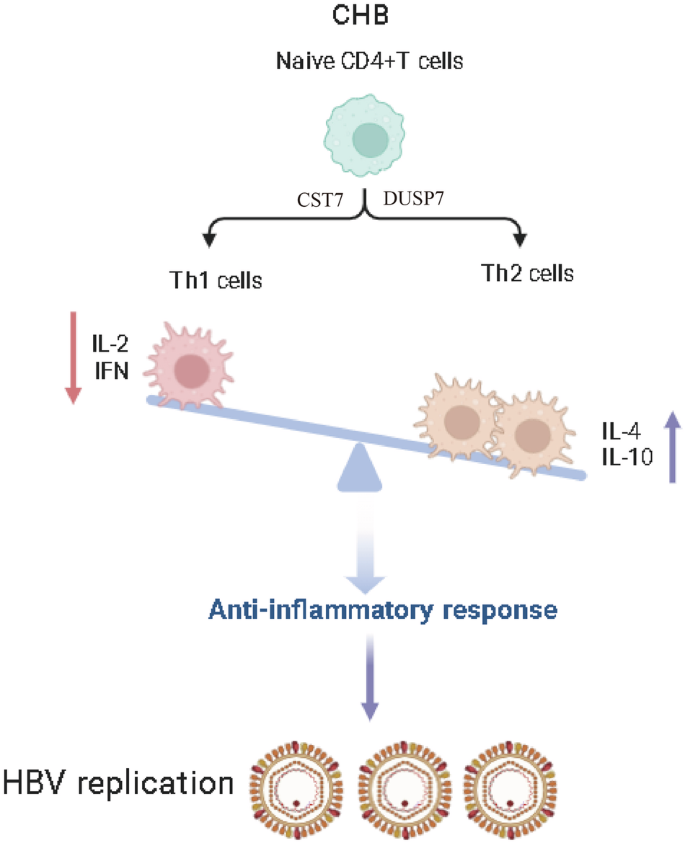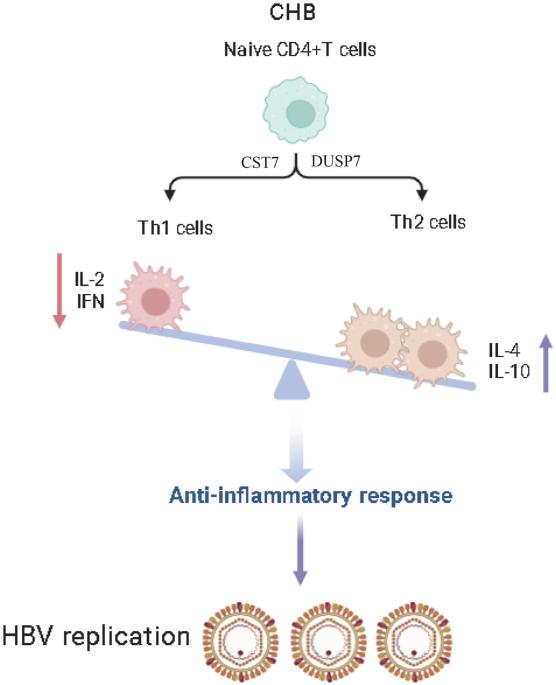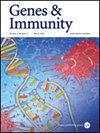Integrated analyses reveal CST7 and DUSP5 regulate Th2 cells differentiation to promote chronic HBV infection
IF 4.5
3区 医学
Q1 GENETICS & HEREDITY
引用次数: 0
Abstract
Chronicity of HBV infection is a complex process influenced by both viral and host factors. Understanding the complex interplay between HBV and cellular immunity is critical. In this study, we used bulk expression datasets for CHB liver tissue from GSE83148 and GSE84044, and scRNA-seq data of CHB liver samples from GSE182159 to find critical genes and immune cells accounted for CHB. We first identified DEGs closely associated with CHB by WGCNA and these genes were intricately linked to differentiation of Th2 cells, which were significantly higher in CHB and positively associated with ALT, AST, HBV-DNA, Scheuer grade and Scheuer stage. Among these DEGs, CST7 and DUSP5 highly expressed in CHB and positively associated with ALT, AST, HBV-DNA, Scheuer grade and Scheuer stage. Moreover, through scRNA-seq, we also found that CST7 and DUSP5 upregulated in Th2 cells and regulated differentiation of naive CD4+ T cells to Th2 cells. Finally, in-vitro studies also showed that HBV infection could significantly up-regulate DUSP5 and CST7 expression. This research strongly revealed that HBV could up-regulate CST7 and DUSP5 to drive differentiation of naive CD4+ T cells into Th2 cells and contribute to CHB, which may pave the way for immunotherapeutic interventions.


综合分析表明,CST7 和 DUSP5 可调控 Th2 细胞分化,从而促进慢性 HBV 感染。
HBV 感染的慢性化是一个受病毒和宿主因素影响的复杂过程。了解 HBV 与细胞免疫之间复杂的相互作用至关重要。在本研究中,我们使用了来自 GSE83148 和 GSE84044 的慢性乙型肝炎肝组织的大量表达数据集,以及来自 GSE182159 的慢性乙型肝炎肝脏样本的 scRNA-seq 数据,以寻找慢性乙型肝炎的关键基因和免疫细胞。我们首先通过WGCNA发现了与CHB密切相关的DEGs,这些基因与Th2细胞的分化密切相关,Th2细胞在CHB中显著增高,并与ALT、AST、HBV-DNA、Scheuer分级和Scheuer分期正相关。在这些DEGs中,CST7和DUSP5在CHB中高表达,并与ALT、AST、HBV-DNA、Scheuer分级和Scheuer分期正相关。此外,通过 scRNA-seq,我们还发现 CST7 和 DUSP5 在 Th2 细胞中上调,并调控幼稚 CD4+ T 细胞向 Th2 细胞分化。最后,体外研究还表明,HBV 感染能显著上调 DUSP5 和 CST7 的表达。这项研究有力地揭示了 HBV 可上调 CST7 和 DUSP5,从而促使幼稚 CD4+ T 细胞分化为 Th2 细胞,并导致慢性阻塞性肺病,这可能为免疫治疗干预铺平道路。
本文章由计算机程序翻译,如有差异,请以英文原文为准。
求助全文
约1分钟内获得全文
求助全文
来源期刊

Genes and immunity
医学-免疫学
CiteScore
8.90
自引率
4.00%
发文量
28
审稿时长
6-12 weeks
期刊介绍:
Genes & Immunity emphasizes studies investigating how genetic, genomic and functional variations affect immune cells and the immune system, and associated processes in the regulation of health and disease. It further highlights articles on the transcriptional and posttranslational control of gene products involved in signaling pathways regulating immune cells, and protective and destructive immune responses.
 求助内容:
求助内容: 应助结果提醒方式:
应助结果提醒方式:


